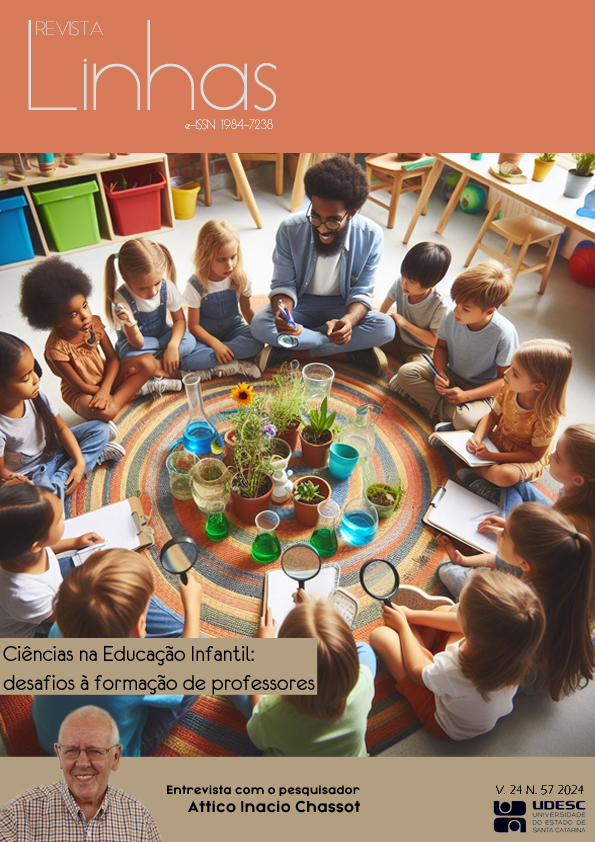Science initiation in early childhood education: nature to play and to experiment
DOI:
https://doi.org/10.5965/1984723825572024019Keywords:
knowledge construction, initiation to science, early childhood education, natureAbstract
The objective of this article is to discuss the perspectives of Science Teaching for early childhood education, adjusting them to the age range and training purposes of this level of education in Brazil, which provides for comprehensive training beyond care. It starts from the principle of building knowledge from the birth of the child, according to Piaget, and bring points to be considerate as keys to thinking about teaching and learning Science, facing advances in this area. Conceptualizations and the formulation of hypotheses, among other aspects, are not yet feasible at this stage of development. A key point for this teaching is the appreciation of research, exploration of the natural environment and experimentation by children at school, aiming to help them establish logical relationships in which they have an active role in the reality they live in. It is argued that early childhood education is a moment of initiation into science with notions built on playing and experimenting with nature, in activities planned in vegetable gardens, gardens and other school spaces. However, teaching objectives and planning are part of supporting the construction of knowledge, without the formalization of a class. Three studies are listed, one of which criticizes the limitation of coloring and copying activities in children's contact with Science content. Alternatives for teaching exemplify relationships and cycles in the themes of stingless bees, germination and water, with rainwater collection to water the garden. Therefore, initiation into science through playing and experimenting with nature are guidelines for changes in Science teaching.
Downloads
References
ANDRADE, M. L. F.; MASSABNI, V. G. O desenvolvimento de atividades práticas na escola: um desafio para os professores de ciências. Ciência & Educação, Bauru, v. 17, n. 4, p. 835-854, 2011.
BRASIL. Lei de Diretrizes e Bases da Educação Nacional. Lei n. 9.394/96. Brasília, DF: Presidência da República, 1996. Disponível em: http://www.planalto.gov.br/ccivil_03/Leis/L9394.htm. Acesso em: 31 out. 2022.
BRASIL. Ministério da Educação. Secretaria de Educação Básica. Base Nacional Comum Curricular. Brasília, DF: MEC, 2018. Disponível em: http://basenacionalcomum.mec.gov.br/#/site/inicio. Acesso em: dez. 2018.
BRASIL. Ministério da Educação. Secretaria de Educação Básica. Brinquedos e brincadeiras de creche. Brasília, DF: MEC/SEB, 2012.
BRASIL. Ministério da Educação. Secretaria de Educação Básica. Diretrizes curriculares nacionais para a educação infantil. Brasília, DF: MEC, 2010.
CAPANARIO, J. M.; MOYA, A. ¿Como enseñar Ciencias? principales tendencias y propuestas. Enseñanza de las Ciencias, Barcelona, v. 17, n. 2, p. 179-192, 1999.
DRIVER, R.; ASOKO, H.; LEACH, J.; MORTIMER, E.; SCOTT, P. Construindo o conhecimento científico em sala de aula. Química Nova na Escola, São Paulo, n. 9, p. 31-40, 1999.
ELALI, G. L. O ambiente da escola: o ambiente na escola: uma discussão sobre a relação escola-natureza em educação infantil. Estudos de Psicologia, Natal, v. 8 n. 2, p. 309-319, 2003.
GIMENO SACRISTÁN, J. O currículo: uma reflexão sobre a prática. 3. ed. Porto Alegre: Artmed, 2017.
GOULART, I. B. Piaget: experiências básicas para utilização pelo professor. 11. ed. Petrópolis: Vozes, 1996.
KRASILCHIK, M. Reformas e realidade: o caso do ensino das ciências. São Paulo em Perspectiva, São Paulo, v. 14, n. 1, p. 85-93, 2000.
LOCONTE, C. O.; PAIVA, J. B.; MASSABNI, V. G.; MARQUES, R. N. Abelhas Jataís e educação ambiental: uma experiência interdisciplinar na formação de professores em Ciências Agrárias. Revista de Graduação da USP, São Paulo, v. 2, n. 3, p. 35-45, 2017.
MASSABNI, V. G.; D. NETO, A.; SOUZA; C. C.; CONDOTTA, I. C. F. S., MODA, A.; GIANNETTI, B. S. H.; CRUZ, S. F. Sustentabilidade na educação infantil: ciclo, aproveitamento e uso consciente da água. Revista Eletrônica Sala de Aula em Foco, Vila Velha, v. 04, n. 01, p. 47-57, 2015. Disponível em: https://ojs.ifes.edu.br/index.php/saladeaula/issue/view/72/22. Acesso em: 6 mar 2024.
MASSABNI, Vânia Galindo. O construtivismo do professor: de Piaget às idéias e práticas de professores de ciências. 2005. Tese (Doutorado em Educação Escolar) – Faculdade de Ciências e Letras, Universidade Estadual Paulista "Júlio de Mesquita Filho", Araraquara, 2005.
Nardi, R. (org.). Questões Atuais no ensino de Ciências. São Paulo: Escrituras Editora, 1998.
OLIVEIRA, M. T. M. (coord.). Didáctica da biologia. Lisboa: Universidade Aberta, 1991.
OSBORNE, J. F. Beyond constructivism. Science Education, [Hoboken, US], v. 80, n.1, p. 53-82, 1996.
PIAGET, J. Epistemologia genética. 2. ed. São Paulo: Martins Fontes, 2002.
PIAGET, J. Problemas de psicologia genética. Rio de Janeiro: Forense, 1973.
POZO, J. I.; CRESPO, M. A. G. A aprendizagem e o ensino de Ciências: do conhecimento cotidiano ao conhecimento científico. 5. ed. Porto Alegre: Artmed, 2009.
RUMENOS, N. N.; MASSABNI, V. G.; BONITO, J. Reforçar a educação em ciências na educação infantil no Brasil. Mimesis, Bauru, v. 40, n. 2, p. 275-296, 2019.
SASSERON, L. H.; CARVALHO, A. M. P. Almejando a alfabetização científica no ensino fundamental: a proposição e a procura de indicadores do processo. Investigações em Ensino de Ciências, Porto Alegre, v. 13, n. 3, p. 333-352, 2008.
ZABALA, A. A prática educativa: como ensinar. Porto Alegre: ArtMed, 1998.
Downloads
Published
How to Cite
Issue
Section
License
Copyright (c) 2024 Revista Linhas

This work is licensed under a Creative Commons Attribution-NonCommercial-NoDerivatives 4.0 International License.
Os artigos publicados pela revista são de uso gratuito, destinados a aplicações educacionais e não comerciais. Os direitos autorais são todos cedidos à revista. Os artigos cujos autores são identificados representam a expressão do ponto de vista de seus autores e não a posição oficial da Revista Linhas ou do Programa de Pós-Graduação em Educação da Universidade do Estado de Santa Catarina.

A Revista Linhas está licenciada com uma Licença Creative Commons - Atribuição-NãoComercial-SemDerivações 4.0 Internacional.


